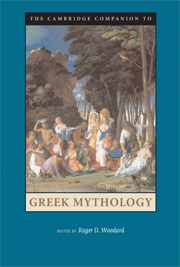Book contents
- Frontmatter
- Introduction: Muthoi in Continuity and Variation
- Part I Sources and Interpretations
- Part II Response, Integration, Representation
- 8 Greek Myth and Greek Religion
- 9 Myth and Greek Art: Creating a Visual Language
- 10 Mythic Landscapes of Greece
- 11 Politics and Greek Myth
- 12 Ovid and Greek Myth
- Part III Reception
- Bibliography
- Index
12 - Ovid and Greek Myth
from Part II - Response, Integration, Representation
Published online by Cambridge University Press: 28 March 2009
- Frontmatter
- Introduction: Muthoi in Continuity and Variation
- Part I Sources and Interpretations
- Part II Response, Integration, Representation
- 8 Greek Myth and Greek Religion
- 9 Myth and Greek Art: Creating a Visual Language
- 10 Mythic Landscapes of Greece
- 11 Politics and Greek Myth
- 12 Ovid and Greek Myth
- Part III Reception
- Bibliography
- Index
Summary
The reason for the continuous mutation of myth … is its cultural relevance.
F. Graf, Greek Mythology: An IntroductionThe social, cultural, and religious milieu in which the poet Ovid moved and wrote was complex, if not chaotic. Myth was a central ingredient of that complexity and chaos. The foundational myths of Aeneas and Romulus were probably current in Rome in the sixth century BCE, and other foundational myths involving the Arcadian king Evander and the Greek hero Hercules followed. But it is from the third century BCE onwards, after the 'invention' of Roman literature, that we witness the start of the complex, multifarious use of Greek myth that was to define the Ovidian treatment. Early Roman epic and drama and late republican poetry, architecture, sculpture, and wall-painting turned to Greek myth as a grammar of Roman experience. They used it for social, exegetic, validatory, discursive, exemplary, referential, and (increasingly) overtly political purposes. Livius Andronicus' Odusia, for example, seems to respond to a mid-third-century need for transcultural validation. Naevius, who introduced the historical drama, the fabula praetexta, seems almost selfconsciously political, highlighting aspects of Rome’s religious policy in Lucurgus, for example, and aetiologising and possibly galvanising political sentiment in Danae. He and Ennius underscored national pride (and that of the Julian and Aemilian families) in Bellum Poenicum and Annales through their epics' affirmation of the city’s descent from Venus.
- Type
- Chapter
- Information
- The Cambridge Companion to Greek Mythology , pp. 355 - 382Publisher: Cambridge University PressPrint publication year: 2007
- 1
- Cited by

